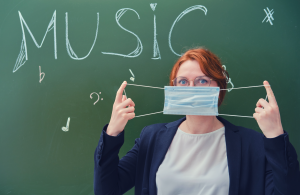Allegro Music Keeps promoting Social Responsibility through their Music and Health Division
Using music help seniors cope with the coronavirus pandemic
Being a music health volunteer is one of the most momentous actions I have ever done; and I hope to inspire others around the world. Music heals”
ESTADO DE MEXICO, PROVINCIA/ESTADO, MéXICO, February 6, 2021 /EINPresswire.com/ -- February 5th. Allegro Music Keeps working in Social Responsibility in their Music and Health Division. — Lizette Weber
The Founder, Lizette Weber is a composer, guitarist, humanist and music therapist. She has a Major Degree in Sciences of Communication, a postgraduate course in Public Speaking at UCSD in San Diego CA. In 2018 she graduated from the prestigious ISDI with the degree of Masters in Internet Business.
Part of her DNA has been geared to contribute and help in noble causes. She works as a volunteer for many nonprofit organizations.
She´s loved music since she was a little girl. At 13, she was a volunteer and attended many nursery homes to help elderly, making them feel better through music.
She was really close to her grandparents who survived the Holocaust and she lived the experience of the great benefits that music had in them.
Music plays an important role in life for people of all ages, forging connections to pivotal events and fond memories. Research has found that music can promote relaxation, improve productivity and lower stress.
For seniors, pleasing melodies can deliver even more benefits for physical and mental health, memory and important social connections.
Music is a fundamental attribute of the human species. Virtually all cultures, from the most primitive to the most advanced, make music. All humans can sing and hum, we clap and sway, we dance and bounce.
The human brain and nervous system are hard-wired to distinguish music from noise and to respond to rhythm and repetition, tones and tunes.
Using music to help seniors cope with the coronavirus pandemic
Many of our lives have changed drastically since the coronavirus pandemic has swept across the world. We’re staying home, quarantined, isolated, and lacking social interaction.
According to Johns Hopkins, music can be considered medicine for your mind.
There are many health benefits associated with music, from improved memory to stress relief, motivation, and even decreased pain from chronic illness. It may come as a surprise to you that something as simple as listening to music can so dramatically improve your quality-of-life.
Allegro Music and Health Division uses music, dance, and art; an expressive art volunteers provide psycho-social support to seniors experiencing a wide range of issues, including adjustment to aging, health status changes, depression, and anxiety.
For many seniors in assisted living, music provides benefits, including lessening of pain and discomfort without the use of medicines, improved ability to remember recent events, positive changes in mood and an increased sense of self-sufficiency.
Music can be highly motivating during any type of exercise, including walking, dancing, stretching and working out with weights. The right music plays an important role in encouraging seniors to get more physical activity, which can help maintain independence and restore function lost due to injuries or illnesses.
Music therapy can increase brain chemicals that arouse positive feelings in people diagnosed with dementia, experts say. If you have a loved one who suffers from dementia, you may have noticed that music can seem to lift her spirits and even transform her entire demeanor.
Not only does music aid in the treatment of dementia, it can also help prevent the debilitating disease.
For seniors with Alzheimer’s and dementia, listening to music can be incredibly beneficial. A study that was conducted by researchers at the University of Miami School of Medicine found that music therapy increased the levels of melatonin, serotonin, norepinephrine, epinephrine, and prolactin in patients with Alzheimer’s.
In many cases, music opens up avenues of communication that otherwise may not be available. Research has demonstrated that listening to music on a regular basis can enhance communication for people with dementia by improving cognition and language abilities.
Music-related activities in assisted living — including dancing, singing, playing musical instruments, listening to music and watching musical performances — can spark discussions that improve connections with friends and family members.
Those brain chemicals are associated with good feelings, improved mood, as well as reduced stress and agitation. The progression of the disease does not affect the brain’s natural response to music. Additionally, music has the ability to evoke memories and emotions from long ago. For seniors with Alzheimer’s and dementia, music can sometimes elicit positive feelings. Songs from childhood, or early adulthood, have been shown to have positive effects even on those in advanced stages of dementia.
Lizette Weber
Allegro Music S.A de C.V
email us here



